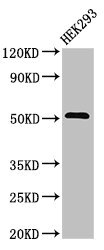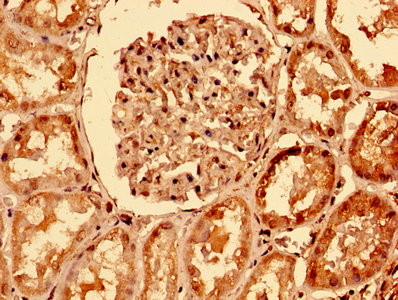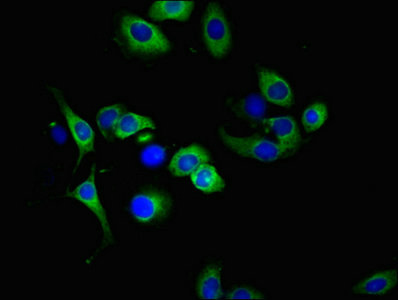-
中文名称:TNFRSF10A兔多克隆抗体
-
货号:CSB-PA023964LA01HU
-
规格:¥440
-
促销:
-
图片:
-
Western Blot
Positive WB detected in: HEK293 whole cell lysate
All lanes: TNFRSF10A antibody at 3.2μg/ml
Secondary
Goat polyclonal to rabbit IgG at 1/50000 dilution
Predicted band size: 51 kDa
Observed band size: 51 kDa -
IHC image of CSB-PA023964LA01HU diluted at 1:400 and staining in paraffin-embedded human kidney tissue performed on a Leica BondTM system. After dewaxing and hydration, antigen retrieval was mediated by high pressure in a citrate buffer (pH 6.0). Section was blocked with 10% normal goat serum 30min at RT. Then primary antibody (1% BSA) was incubated at 4°C overnight. The primary is detected by a biotinylated secondary antibody and visualized using an HRP conjugated SP system.
-
IHC image of CSB-PA023964LA01HU diluted at 1:400 and staining in paraffin-embedded human colon cancer performed on a Leica BondTM system. After dewaxing and hydration, antigen retrieval was mediated by high pressure in a citrate buffer (pH 6.0). Section was blocked with 10% normal goat serum 30min at RT. Then primary antibody (1% BSA) was incubated at 4°C overnight. The primary is detected by a biotinylated secondary antibody and visualized using an HRP conjugated SP system.
-
Immunofluorescent analysis of A549 cells using CSB-PA023964LA01HU at dilution of 1:100 and Alexa Fluor 488-congugated AffiniPure Goat Anti-Rabbit IgG(H+L)
-
Immunoprecipitating TNFRSF10A in 293 whole cell lysate
Lane 1: Rabbit control IgG (1μg) instead of CSB-PA023964LA01HU in 293 whole cell lysate. For western blotting, a HRP-conjugated Protein G antibody was used as the secondary antibody (1/2000)
Lane 2: CSB-PA023964LA01HU (6μg) + 293 whole cell lysate (500μg)
Lane 3: 293 whole cell lysate (10μg)
-
-
其他:
产品详情
-
产品名称:Rabbit anti-Homo sapiens (Human) TNFRSF10A Polyclonal antibody
-
Uniprot No.:O00220
-
基因名:
-
别名:TNFRSF10A; APO2; DR4; TRAILR1; Tumor necrosis factor receptor superfamily member 10A; Death receptor 4; TNF-related apoptosis-inducing ligand receptor 1; TRAIL receptor 1; TRAIL-R1; CD antigen CD261
-
宿主:Rabbit
-
反应种属:Human
-
免疫原:Recombinant Human Tumor necrosis factor receptor superfamily member 10A protein (263-468AA)
-
免疫原种属:Homo sapiens (Human)
-
标记方式:Non-conjugated
本页面中的产品,TNFRSF10A Antibody (CSB-PA023964LA01HU),的标记方式是Non-conjugated。对于TNFRSF10A Antibody,我们还提供其他标记。见下表:
-
克隆类型:Polyclonal
-
抗体亚型:IgG
-
纯化方式:>95%, Protein G purified
-
浓度:It differs from different batches. Please contact us to confirm it.
-
保存缓冲液:Preservative: 0.03% Proclin 300
Constituents: 50% Glycerol, 0.01M PBS, pH 7.4 -
产品提供形式:Liquid
-
应用范围:ELISA, WB, IHC, IF, IP
-
推荐稀释比:
Application Recommended Dilution WB 1:1000-1:5000 IHC 1:100-1:500 IF 1:50-1:500 IP 1:200-1:2000 -
Protocols:
-
储存条件:Upon receipt, store at -20°C or -80°C. Avoid repeated freeze.
-
货期:Basically, we can dispatch the products out in 1-3 working days after receiving your orders. Delivery time maybe differs from different purchasing way or location, please kindly consult your local distributors for specific delivery time.
引用文献
- Chemically modified liposomes carrying TRAIL target activated hepatic stellate cells and ameliorate hepatic fibrosis in vitro and in vivo Li Q, et al,Journal of Cellular and Molecular Medicine,2018
相关产品
靶点详情
-
功能:Receptor for the cytotoxic ligand TNFSF10/TRAIL. The adapter molecule FADD recruits caspase-8 to the activated receptor. The resulting death-inducing signaling complex (DISC) performs caspase-8 proteolytic activation which initiates the subsequent cascade of caspases (aspartate-specific cysteine proteases) mediating apoptosis. Promotes the activation of NF-kappa-B.
-
基因功能参考文献:
- A graphene-based nanocarrier modified with death receptor 4 (DR4) antibody and AKT siRNA has been developed, which can synergistically strengthen death receptor-mediated apoptosis and enhance the cancer therapeutic effect in vivo. PMID: 30430148
- By downregulating TRAIL-R1, TGFbeta1 may not only promote tumor escape from immune surveillance but also negatively impact on TRAIL- or TRAIL-R1-based therapy regimens for treatment of Pancreatic ductal adenocarcinoma. PMID: 27492861
- findings together highlight a previously undiscovered mechanism that positively regulates DR4 expression through activation of the MEK/ERK/AP-1 signaling pathway. PMID: 27576686
- results suggest that the altered TRAIL, DR4 alleles and sTRAIL levels may be associated with some other potential biomarkers for vitiligo PMID: 26404509
- These statistical data suggest that Thr209Arg in exon 4 of the TRAIL-R1 gene may not represent a modifier of susceptibility to cancer. PMID: 26315998
- LOC389641 promotes pancreatic ductal adenocarcinoma progression and increases cell invasion by regulating E-cadherin with the possible involvement of TNFRSF10A. PMID: 26708505
- Results showed DR4 promotor methylation and low protein expression level in patients with lung squamous carcinoma which correlated with the prognosis of the disease. PMID: 26238205
- Genetic variation of TRAIL-R1 rs4242392 is linked with response to interferon-based therapy for hepatitis C virus infection, and genetic variation IFN-gamma rs2069707 is associated with natural clearance of hepatitis C virus infection. PMID: 25798684
- The rs13278062 polymorphism of the DR4 gene not only can confer an increased risk for crohn disease, but may also influence the location of the lesions and the disease behaviors. PMID: 26418999
- Lovastatin enhances adenovirus-mediated TRAIL induced apoptosis by depleting cholesterol of lipid rafts and affecting CAR and death receptor expression of prostate cancer cells. PMID: 25605010
- Our observations suggested that genetic variants of the DR4 gene significantly influence the risk of PCa in North Indian population and might be involved in the etiology of PCa. PMID: 25691252
- TRAIL-DR4 polymorphism is associated with laryngeal squamous cell carcinoma. PMID: 25605161
- was statistically significant association between DR4 expression in basal cell carcinoma and histopathologic subtypes PMID: 24212133
- Over-expression of TRAIL-R1 is associated with breast cancer. PMID: 25230899
- human TRAIL-R1 SNPs modulate the innate immune response against chlamydial infection. This is the first evidence that human TRAIL-R1 is a negative regulator of inflammation and plays a role in modulating Chlamydia pathogenesis. PMID: 24695582
- DR4 polymorphism C626G and A683 rather than A1322G are associated with cancer risk. PMID: 24761920
- DR4 haplotypes are associated with increased susceptibility of gallbladder carcinoma in north Indian population. PMID: 24587306
- Report DR4 up-regulation in alveolar epithelial cells from idiopathic pulmonary fibrosis patients. PMID: 24551275
- propose a model of TRAIL receptor interference driven by PLAD-mediated formation of receptor heterodimers on the cell membrane PMID: 24764293
- Investigated the association between G422A, C626G, A683C and A1322G polymorphisms in DR4 gene and lung cancer. PMID: 23661154
- C626G and A1322G polymorphisms of DR4 are associated with increased cancer risk, but the A683C polymorphism is rarely associated with cancer risk PMID: 24492941
- Malignant transformation in the endometrium is related to reduction of membrane DR4 and DR5 expression PMID: 23815209
- the gradual increase in TRAIL receptor expression during colorectal carcinogenesis is at least partially mediated through increased beta-catenin expression. PMID: 24379239
- lipid microdomains could exert a catalytic role for DR4-mediated cell death. PMID: 24136227
- SNP rs13278062, but not rs1713985 showed nominal evidence of association with AMD in a total of 1273 cases and 1652 controls of Chinese descent. PMID: 24235014
- The antiproliferative GSI-I/TRAIL synergism was stronger in ER-negative MDA-MB-231 breast cancer cells compared with ER-positive MCF-7 cells. In MDA-MB-231 cells, GSI-I treatment induced upregulation of DR4 and DR5 TRAIL receptors PMID: 23686163
- Deletion of TRAIL-R2) is relevant to the loss of 8p21.3 and plays a role in the pathogenesis of multiple myeloma. PMID: 23423784
- Loss of membrane TRAIL-R1 expression is associated with early stage colorectal cancer. PMID: 23284732
- endogenous MARCH-8 regulates the steady-state cell surface expression of TRAIL-R1. PMID: 23300075
- the C626G polymorphism of DR4 may be associated with the risk and severity of lumbar disc degeneration in the Chinese Han population PMID: 23050498
- Endometriosis is not associated with osteoprotegerin gene polymorphism. PMID: 22392486
- DR4 is forming DISC complex to activate proximal caspases for apoptosis by TRAIL. PMID: 22240897
- we found that the TRAIL receptor I wild type with threonine at amino acid position 209 (626C) and alanine at position 228 (638A) is associated with an increased risk of Hepatocellular carcinoma in patients with chronic hepatitis C. PMID: 22401174
- DR4, both as the complete form or as its new short isoform, is involved in TRAIL sensitivity in Ewing's sarcoma. PMID: 22258765
- A significant association of DR4 683A > C with a higher risk for ovarian cancer in carriers of BRCA1 mutations. PMID: 21484799
- The key differential events in apoptotic cells are p53-dependent activation of the DR4 death receptor pathway, caspase 8-mediated cleavage of BID, and BID-dependent activation of poised BAX at the mitochondria. PMID: 22246181
- miR-25 target DR4 provides a mechanism by which miR-25 contributes to evasion of TRAIL-induced cholangiocarcinoma apoptosis PMID: 21953056
- This pilot study suggests that loss of TRAIL receptors is a frequent feature of hepatocellular carcinoma and an independent predictor of survival in patients undergoing partial hepatectomy. PMID: 20889918
- ATRA upregulated TRAIL-R1 transcription in human cancer cells via 2 putative retinoic acid response elements: Pal-17 (a palindrome separated by 17 bases) & DR-11 (a direct repeat separated by 11 bases) in the 5'-flanking region. PMID: 21685476
- Association of death receptor 4, Caspase 3 and 5 gene polymorphism with increased risk to bladder cancer in North Indians. PMID: 21700414
- There was no chenage in expression of DR4 in leukemic cell lines after treatment with sodium butyrate. PMID: 19379558
- The rs4242392 SNP of the tumor necrosis factor-related apoptosis-inducing ligand receptor 1 gene predicted poor interferon-based HCV treatment response in HIV/HCV-coinfected patients. PMID: 20802294
- Data show that the apoptosis mechanisms underlying this sensitization mainly involved diosgenin-induced p38 MAPK pathway activation and subsequent DR5 overexpression. PMID: 21195543
- TRAIL-R1 expression was an independent prognostic marker for better survival in all CRC samples and even in the CRC group that received adjuvant therapy PMID: 20673328
- TRAIL receptor DR4 was highly expressed in THP-1 & LPS-primed primary monocytes but not in the non-primed primary monocytes. TRAIL induces monocyte migration mediated by TRAIL receptor DR4 via the RhoGTPase signaling pathway. PMID: 20638129
- five tentative epitopes on human TRAIL-R1 were shown to be post-translationally modified on some tumor cell lines. PMID: 20363213
- Human DR4 is regulated by activator protein 1 via the AP-1-binding site at -350/-344. PMID: 12082627
- induces monocytic maturation of leukemic and normal myeloid precursors through a caspase-dependent pathway PMID: 12239152
- Tyrosine-based sorting signal in adenovirus RID plays a role in RID's ability to down-regulate TRAIL R1 receptor and inhibit TRAIL induced apoptosis PMID: 12388693
- Decreased expression of DR4 may contribute to prolonged survival of eosinophils in the airways of allergic asthmatics following segmental antigen challenge. PMID: 12421985
显示更多
收起更多
-
亚细胞定位:Cell membrane; Single-pass type I membrane protein. Membrane raft. Cytoplasm, cytosol.
-
组织特异性:Widely expressed. High levels are found in spleen, peripheral blood leukocytes, small intestine and thymus, but also in K-562 erythroleukemia cells, MCF-7 breast carcinoma cells and activated T-cells.
-
数据库链接:
HGNC: 11904
OMIM: 603611
KEGG: hsa:8797
STRING: 9606.ENSP00000221132
UniGene: Hs.213467
Most popular with customers
-
-
YWHAB Recombinant Monoclonal Antibody
Applications: ELISA, WB, IF, FC
Species Reactivity: Human, Mouse, Rat
-
Phospho-YAP1 (S127) Recombinant Monoclonal Antibody
Applications: ELISA, WB, IHC
Species Reactivity: Human
-
-
-
-
-


























